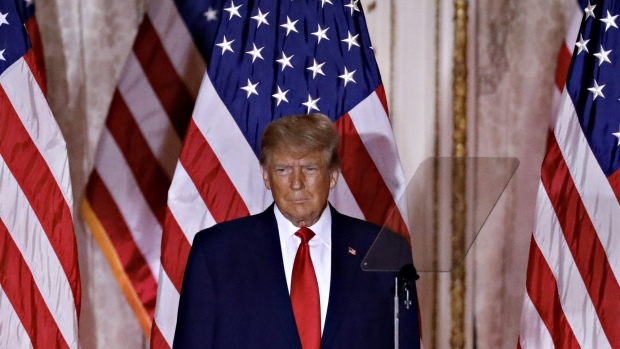Dec 19, 2022
Trump, Eastman Criminal Referrals Have Roots in Ruling by Judge Nine Months Ago
, Bloomberg News

(Bloomberg) -- Nine months ago, a federal judge in southern California said former President Donald Trump may have committed crimes related to the US Capitol riot on Jan. 6, 2021. It was a bold statement at the time, but one that has now been officially embraced by a special House panel investigating the events that led to the attack.
The Jan. 6 committee issued criminal referrals Monday against Trump — a first for a former president — along with conservative attorney John Eastman. The seeds for that decision were sown by US District Judge David Carter, who concluded in March that Trump “more likely than not” committed federal crimes by trying to overturn the results of the 2020 election he lost.
Carter was the first judge to draw that conclusion, though he wasn’t presiding over a criminal case. He was ruling on Eastman’s efforts to prevent the committee from seeing his emails, which he claimed were shielded by privileges for legal work. Carter ordered Eastman to hand some of them over, and his findings, along with the records, served as a legal foundation for the committee’s decision to recommend charges.
The committee now has urged the US Justice Department to consider prosecuting Trump for four offenses: obstructing Congress’ certification of the 2020 election results, conspiracy to defraud the US, conspiring to submit fake slates of electors, and inciting insurrection. The committee implicated Eastman in several of those alleged crimes.
Read More: Jan. 6 Panel Unanimously Urges Criminal Charges for Trump
Maryland Representative Jamie Raskin, a member of the committee, said on Monday that Carter’s findings in the litigation over Eastman’s emails were the “starting point for our analysis.”
The judge, in his 44-page ruling, had offered a blistering assessment of potential criminal liability for Trump and Eastman, a former Chapman University law professor and post-election adviser to the former president.
“Dr. Eastman and President Trump launched a campaign to overturn a democratic election, an action unprecedented in American history,” Carter wrote. “Their campaign was not confined to the ivory tower — it was a coup in search of a legal theory.”
Two of the four potential federal crimes outlined by the committee were first cited by Carter — corruptly obstructing an official proceeding and conspiracy to defraud the US.
“If Dr. Eastman and President Trump’s plan had worked, it would have permanently ended the peaceful transition of power, undermining American democracy and the Constitution,” the judge wrote. “If the country does not commit to investigating and pursuing accountability for those responsible, the Court fears January 6 will repeat itself.”
The Jan. 6 committee has touted the work of the judicial branch before. More than 900 people have been prosecuted in Washington, DC, for their roles in the attack on the Capitol, and some of the judges overseeing those cases have made it clear they held Trump and other prominent Republicans responsible even if they hadn’t been charged.
Former Marine
Carter, who sits in the federal courthouse in Santa Ana, was nominated by former President Bill Clinton. He’s been on the US District Court for the Central District of California since October 1998, and has been a judge for more than four decades, having previously served as a state court judge.
The judge declined an interview request. Earlier profiles of him noted his decorated service during the Vietnam War in the US Marine Corps. The Orange County Register reported that he decided to go to law school while recovering from battle wounds. The Orange County Lawyer reported Carter was influenced by his grandfather, a court bailiff, who raised him after his father abandoned him.
Tracy Wilkison, a former US attorney for the Central District of California, said Carter was “extremely respected” by local attorneys. She described the judge as “very disciplined” in running his courtroom, working long hours, and that he expected the same of lawyers. Wilkison said any private political leanings he might have were not on display.
The Eastman case isn’t the first high-profile matter Carter handled.
He presided over the estate fight involving the late Playboy model Anna Nicole Smith, a million-dollar copyright dispute over Barbie dolls, and litigation more than two decades ago over the right of public school students to form a “Gay-Straight Alliance Club.”
Wilkison, a senior managing director at FTI Consulting, said Carter is known for showing the same level of investment in all cases regardless of public interest.
©2022 Bloomberg L.P.


